 When you’re facing down over a ton of water buffalo charging your group from the rear, it seems like a simple decision to squeeze the trigger. After all, the animal is threatening, and to not shoot it would put the lives of your companions in danger. But why are you there in the first place? For Bruce Fox, it’s a story rooted in a lifetime as an avid outdoorsman and conservationist.
When you’re facing down over a ton of water buffalo charging your group from the rear, it seems like a simple decision to squeeze the trigger. After all, the animal is threatening, and to not shoot it would put the lives of your companions in danger. But why are you there in the first place? For Bruce Fox, it’s a story rooted in a lifetime as an avid outdoorsman and conservationist.
Though Fox, a 66-year-old attorney in Clinton, embraces a passion for hunting, he strikes an intricate balance between the pursuit of game and a deep-seated desire for preservation. His grandfather taught him to hunt and fish; he also imparted a genuine love and respect for nature.
During his formative years, Fox developed a conscientious passion for outdoor sport, developing a deep understanding of and respect for the animals he hunts. “I hunt and fish because I love the outdoors,” Fox explains. “I love to interact with nature. When I hunt, I want to understand the habits of the animals. I want to know what their life cycle is like. I enjoy the challenge of the hunt.”
Fox is a longtime member of, and sits on the board of directors of the Tennessee Wildlife Federation, the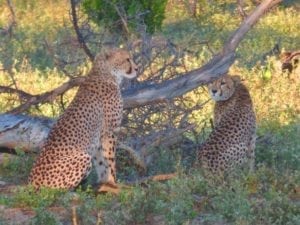 political arm of the Tennessee Wildlife Resources Association. He knows the right levers to push and conversations to have when it comes time to confront an issue. “Our job is to preserve and protect,” says Fox. “We want to foster and encourage the next generation to have a positive impact on the outdoors. I bring perspective to the group. I’m dedicated to preserving access.”
political arm of the Tennessee Wildlife Resources Association. He knows the right levers to push and conversations to have when it comes time to confront an issue. “Our job is to preserve and protect,” says Fox. “We want to foster and encourage the next generation to have a positive impact on the outdoors. I bring perspective to the group. I’m dedicated to preserving access.”
Bucket List
When Fox is off the clock and billable hours, he’s likely to be off the grid, too.
He’s hunted in nearly every part of the United States, and even has had opportunities with friends in Mexico. But he never had a chance at the “big game.” That is, until a health scare sent him to evaluate his “bucket list.” Mary Jane, his wife of 20 years, asked Bruce what he’s always wanted to do.
It didn’t take long for him to answer.
“I’ve always wanted to hunt Africa,” he says. No problem. Last May, Bruce and Mary Jane, who accompanied Bruce every step of the way but never picked up one of the big game rifles, were booked for an 18-day excursion to southeast Zimbabwe that included eight days of hunting and four days of photo safari.
This wasn’t a “line ‘em up and shoot ‘em” expedition. This was an organized and regimented hunt. There were rules. There were expectations. There was imminent danger. There was also a large measure of responsibility.
Current Headlines
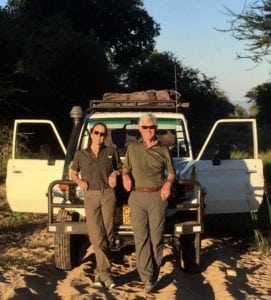 Before leaving for the trip, Fox was given a list of animals he was allowed to hunt. He could choose his prey. Wildebeest, impala, kudu and wild buffalo were among the offerings. Elephant and rhinoceros were strictly forbidden.
Before leaving for the trip, Fox was given a list of animals he was allowed to hunt. He could choose his prey. Wildebeest, impala, kudu and wild buffalo were among the offerings. Elephant and rhinoceros were strictly forbidden.
This launched Fox into a discussion of recent White House edicts that have softened the regulations allowing tusks and other trophies to be shipped into the U.S. “Easing those rules encourages poachers,” he notes. “Poachers are what upset the balance. When you’re there, you realize that hunters contribute to the conservancy of animals. There is a reason for everything that’s done.”
The Dallas Safari Club has been active on social media trying to get the word out about the influence that organized safaris have in trying to solve the problems caused by poachers. Poachers will try to trap the large animals, wait until they die, then harvest the valuable parts. When safari workers see a trapped animal, it is released. Fox says that anyone caught poaching for meat will be arrested. Anyone caught poaching for the tusks will be shot on sight. They’ve taken to using drones to track the poachers.
When a safari hunter kills an animal, the meat is taken to a nearby village to be distributed as food. When the safari trucks roll in, the village comes to life.
“Five-Star Life”
This was nowhere near the normal hunting expedition. Fox says it was closer to a “five-star tent experience.” Tents were large and situated on cement slabs with running water. No cots, but rather comfy beds. At the end of each day, hunters were met with warm, moist towels and cocktails.
They were accompanied by a crew of 10—an executive chef, a tracker, a scout, a driver, a professional hunter, and others with a variety of jobs—that made sure Bruce and Mary Jane had a pampered experience. May, the end of Zimbabwe’s fall and start of winter, was the perfect time to go: a temperate climate with no rain and few insects.
“We’d be in the camp and there would be monkeys and orangutans all over in the trees,” Bruce says. “At night, if you left your tent, you had to be with an armed escort. The tents were triple-layered and zipped shut. No animal was going to get in. There was an electric fence on the perimeter to keep the elephants out. We heard lions and leopards walking through the camp all night. This was way more sophisticated that we ever dreamed it would be.”
There was an area with the purpose of lounging during the day. Afternoon naps were available, if desired. There 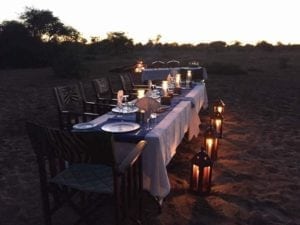 was a designated dining area, with all the amenities. Dinners, which often included animals that were recently killed, were gourmet caliber. “Mary Jane said she was going to write a country song when we got home,” he says with a laugh. “‘We’re a two-star couple leading a five-star life’.”
was a designated dining area, with all the amenities. Dinners, which often included animals that were recently killed, were gourmet caliber. “Mary Jane said she was going to write a country song when we got home,” he says with a laugh. “‘We’re a two-star couple leading a five-star life’.”
One evening, they were being driven back to camp when firelight appeared on the horizon. There was talk of poachers and a ripple of excitement and fear passed through the group. But no, their hosts had set up an evening of dining al fresco, safari style: away from camp on the edge of the wild.
“Black Death”
Bruce says the most intriguing and exhausting challenge of the trip was the chase of the wild buffalo.
“Ian, our professional hunter, said the wild buffalo are called ‘black death’ for a reason,” Bruce notes. “If you track them, they will be angered. They will come at you.” In the herd of wild buffalo, the older, non-breeding bulls are exiled to the perimeter. That bachelor group was going to be the target of the hunt.
Fox was outfitted with a .375 Holland & Holland Magnum medium-bore rifle. This was a heavy-duty weapon. “It packed a pretty good wallop,” he says. He adds that he and his professional hunter had to take turns “sighting” the rifle because repeated shots exhausted them both.
The group was on foot for a good portion of the 2½ hours—covering between five and six miles—that went into tracking the buffalo splinter group. One large animal broke away and was selected as the target of the hunt. There were times, because of the thick brush, that no one in the group was able to see beyond ten feet ahead of them. That made it dangerous because the buffalo, when it knows it is being stalked, has a tendency to circle back and surprise its predator from behind.
In this case, that sort of ambush came to fruition. “Our scout suddenly and quietly dropped down to a crouch,” Bruce says. “Ian, the professional hunter, knew what that meant. He calmly and quietly said, ‘Step forward and put your gun in the V [a rifle support], he’s coming. You’ll want to shoot him in the shoulder’.”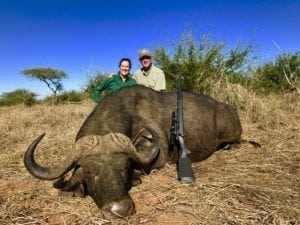
Fox says he knew the gravity of the situation. If he shot and missed, the buffalo would charge and the group would be at risk. “I saw him drop his head and I squeezed the trigger,” he relates. “It was such an intense moment. I heard the noise of the gun, but I never felt (the wallop).”
Fox notes that he heard some grunts as the animal ran off, then a loud shriek. He later learned that this is called the “death bellow.” They located the 2,500 lb. animal as it lay dead.
Next Time
 There was a time, before the trip, when Bruce would call this a “once in a lifetime opportunity.” His friends who had made a similar trip just laughed.
There was a time, before the trip, when Bruce would call this a “once in a lifetime opportunity.” His friends who had made a similar trip just laughed.
“They told me that I’d be back,” Fox says. “I didn’t understand them until I experienced it. Once that happened, I had to do it again.” His journey for September, 2019, is already booked and paid for.
It wasn’t just the skins and horns that will keep him coming back. It’s the lesson that, while going through this terrific experience, he’s helping play a role in the overall animal conservancy that’s being challenged in Zimbabwe and other parts of Africa.
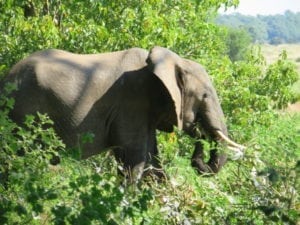 “The hunting dollars go to cover the scout teams that are in place to protect the rhinos and the elephants Every ounce of meat that’s taken is eaten by the people in the villages. I saw the reality of the situation firsthand. I understand the struggles that they’re having and the reasons they’re working so hard to enforce the laws there.”
“The hunting dollars go to cover the scout teams that are in place to protect the rhinos and the elephants Every ounce of meat that’s taken is eaten by the people in the villages. I saw the reality of the situation firsthand. I understand the struggles that they’re having and the reasons they’re working so hard to enforce the laws there.”
At the same time, he also allowed himself to be a bit selfish. “That experience reinvigorated and excited me,” he says as he thumbs through many photos on his tablet. “Just looking at it again gets me excited. So many memories come rushing back. I just love re-living it.”
A bucket list has room for quite an encore.

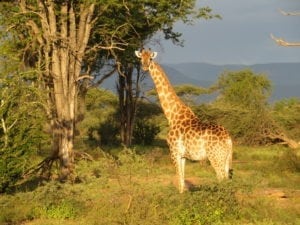 When you’re facing down over a ton of water buffalo charging your group from the rear, it seems like a simple decision to squeeze the trigger. After all, the animal is threatening, and to not shoot it would put the lives of your companions in danger. But why are you there in the first place? For Bruce Fox, it’s a story rooted in a lifetime as an avid outdoorsman and conservationist.
When you’re facing down over a ton of water buffalo charging your group from the rear, it seems like a simple decision to squeeze the trigger. After all, the animal is threatening, and to not shoot it would put the lives of your companions in danger. But why are you there in the first place? For Bruce Fox, it’s a story rooted in a lifetime as an avid outdoorsman and conservationist.